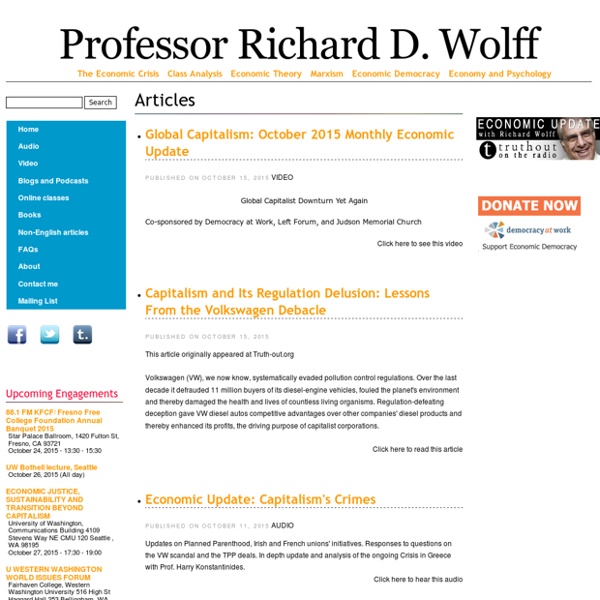



Democracy At Work An Interview with Richard Wolff Today, Wolff has emerged as one of — if not the number one — most prominent leftist economist in America. In addition to teaching the Big Bad Wolff appears on Free Speech TV, Link TV, Pacifica Radio, does public speaking at the Brecht Forum and other venues, writes books such as Capitalism Hits the Fan, Occupy the Economy and Democracy at Work and has a substantial online presence, arguing there’s a better way to run the economy that’s in the interests of the 99%, instead of the 1%. In this interview, Wolff discusses his vision for changing the capitalist system. Fundamentally, he poses the question that if America has repeatedly gone to war abroad “to make the world safe for democracy,” isn’t it time that we brought the war home to make the American workplace safe for democracy, too? Read the interview here. A New Political Strategy Read more of the latest blog entry by Richard Wolff here. We Need Your Generous Gift to Keep On Keep’n On
Ten Signs of a Culture's End We'd like to welcome you to the Clinton Library -- dedicated to preserving the true legacy of the 42nd President of the United States. Bill Clinton promised as President that his would be the "most ethical administration in the history of the country.” As you explore the pages of this website, you can decide for yourself whether he lived up to that promise Written by Brad Keena There are ten signs that depict the end of a culture. Great civilizations of the past were destroyed when people saw these signs but failed to act. The first sign of the end of a culture is that of a society which no longer worships or acknowledges God. A second indicator of the end of a culture is the decline of the family. A third important indicator of cultural demise is a society's low view of life. Another sign of the end of the civilization is the prevalence of base and immoral entertainment. Still another troublesome indicator of society's demise is the increase of violent crime among young people.
geen goesting om te sorteren other cooperation 4DIAC: About Resource Based Economy Zeitgeist Rotterdam Geschreven door The Zeitgeist Movement Aangemaakt op vrijdag, 01 juli 2011 12:17 Een Alteratief Een Resource Based Economy of 'op bronnen gebaseerde economie' is een systeem waarin alle goederen of diensten aangeboden worden zonder het gebruik van geld, crediet, ruilhandel of een andere vorm van schuld of verplicht arbeid. Alle grondstoffen van de Aarde zijn het algemeen erfgoed van alle inwoners en niet alleen van een geselecteerd aantal. Technologie De moderne samenleving heeft toegang tot geavanceerde technologieën waarmee we voedsel, onderdak, kleding en medische zorg beschikbaar kunnen stellen voor iedereen. Grondstoffen Versus Geld We nemen het volgende voorbeeld: Aan het begin van de tweede wereld oorlog had de Verenigde Staten maar 600 eerste klas gevechtsvliegtuigen. Het waren de beschikbare grondstoffen die de Verenigde Staten in staat stelden om deze hoge productiviteit en efficiëntie voort te brengen om de oorlog te 'winnen'. Het Individu In De Samenleving
Predictably Irrational Predictably Irrational: The Hidden Forces That Shape Our Decisions is a 2008 book by Dan Ariely, in which he challenges readers' assumptions about making decisions based on rational thought. Ariely explains, "My goal, by the end of this book, is to help you fundamentally rethink what makes you and the people around you tick. I hope to lead you there by presenting a wide range of scientific experiments, findings, and anecdotes that are in many cases quite amusing. Once you see how systematic certain mistakes are--how we repeat them again and again--I think you will begin to learn how to avoid some of them".[1] The book is unique in that it offers a down-to-earth descriptions of rigorous academic research that is described in a very appealing and accessible manner. Chapter summary[edit] Ariely discusses many modes of thinking and situations that may skew the traditional rational choice theory. The Truth about Relativity[edit] See also[edit] The Fallacy of Supply and Demand[edit] Notes[edit]